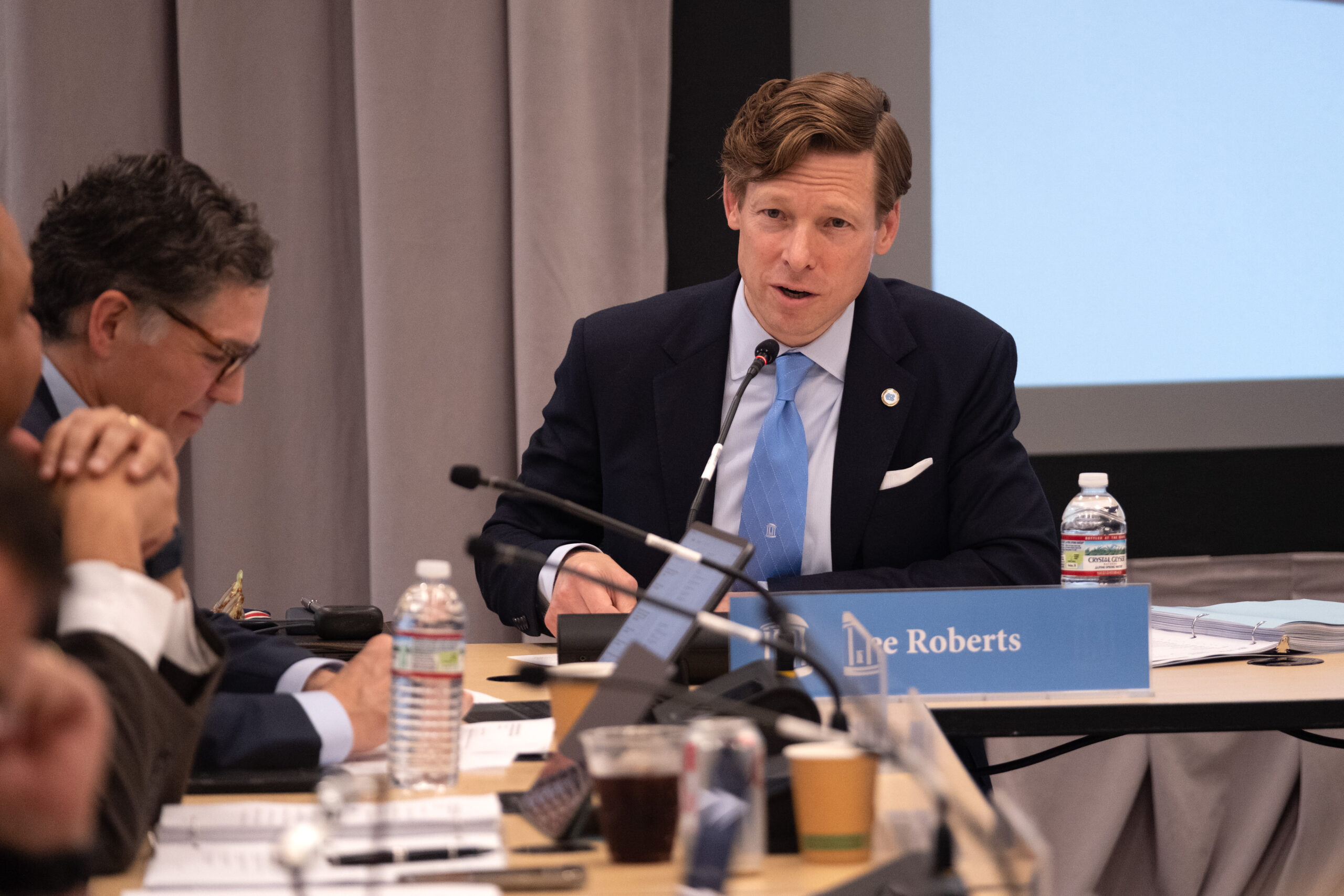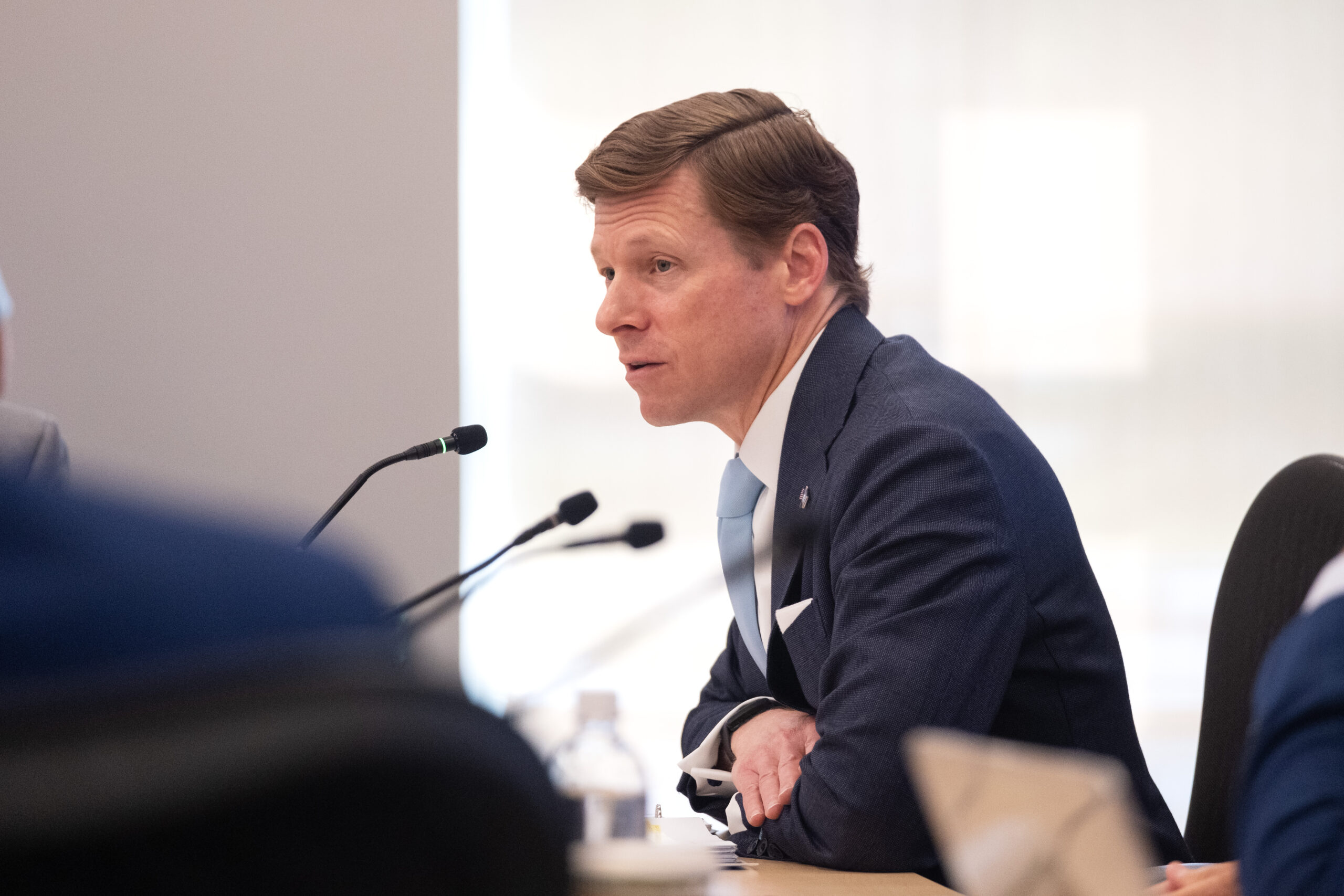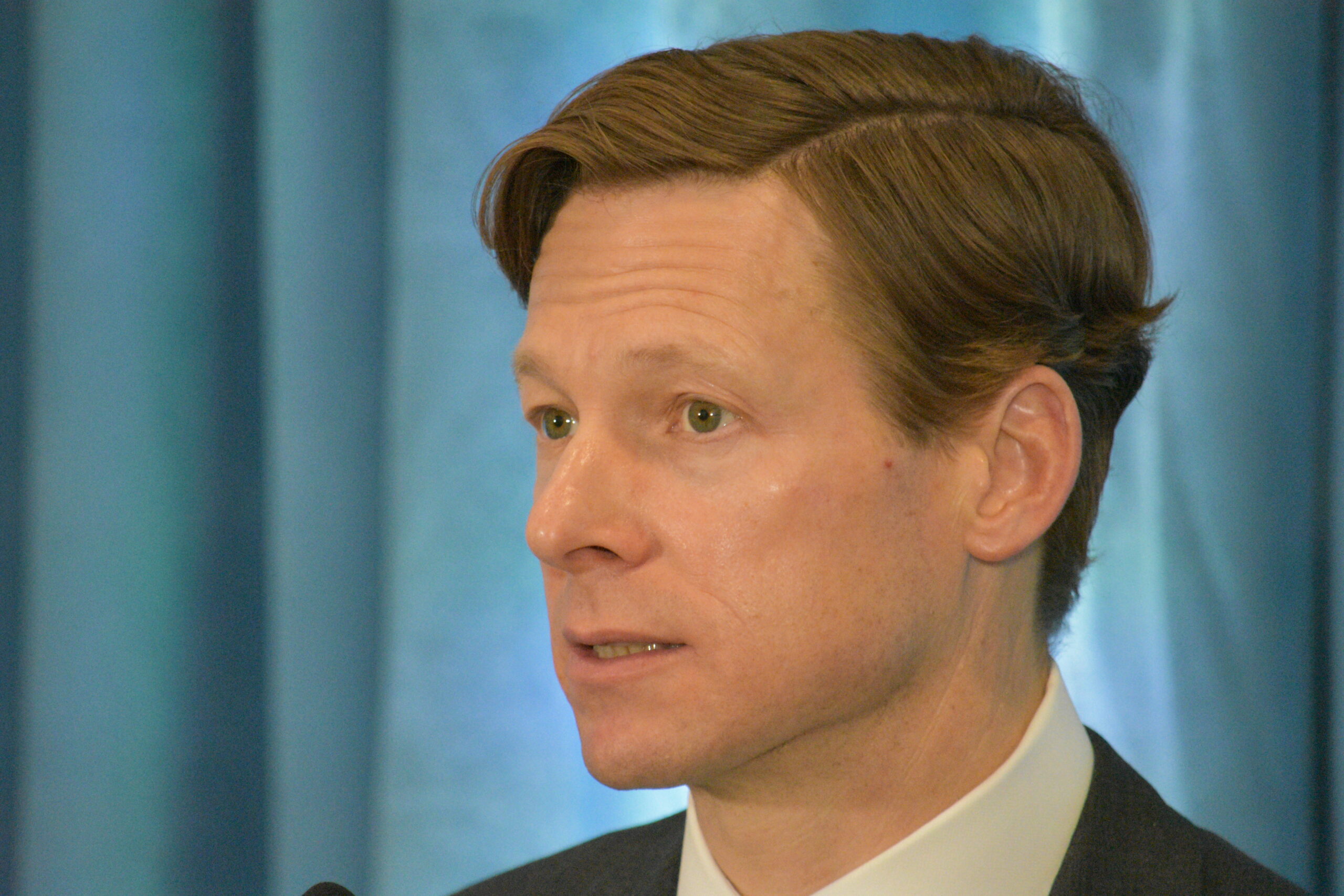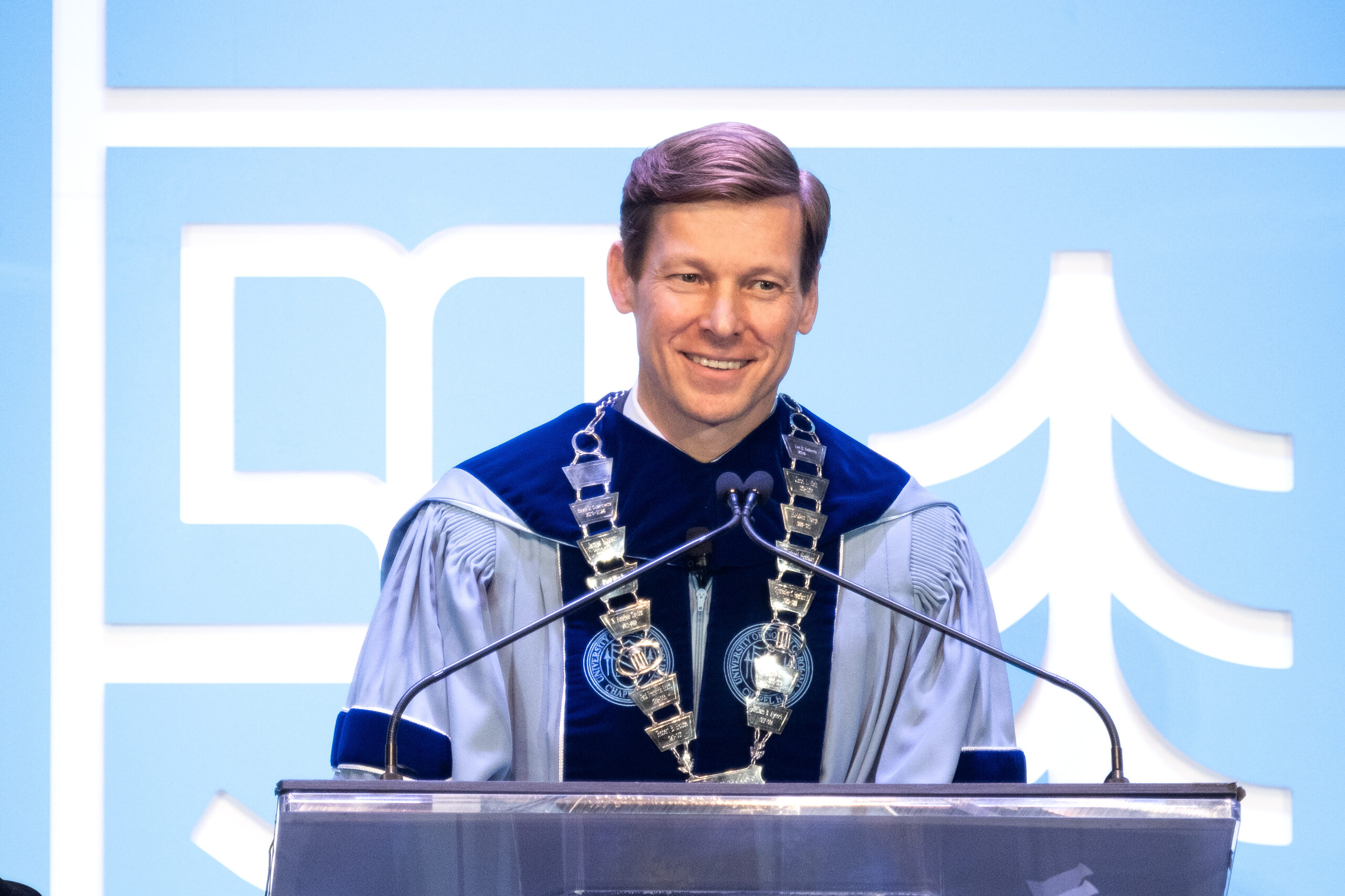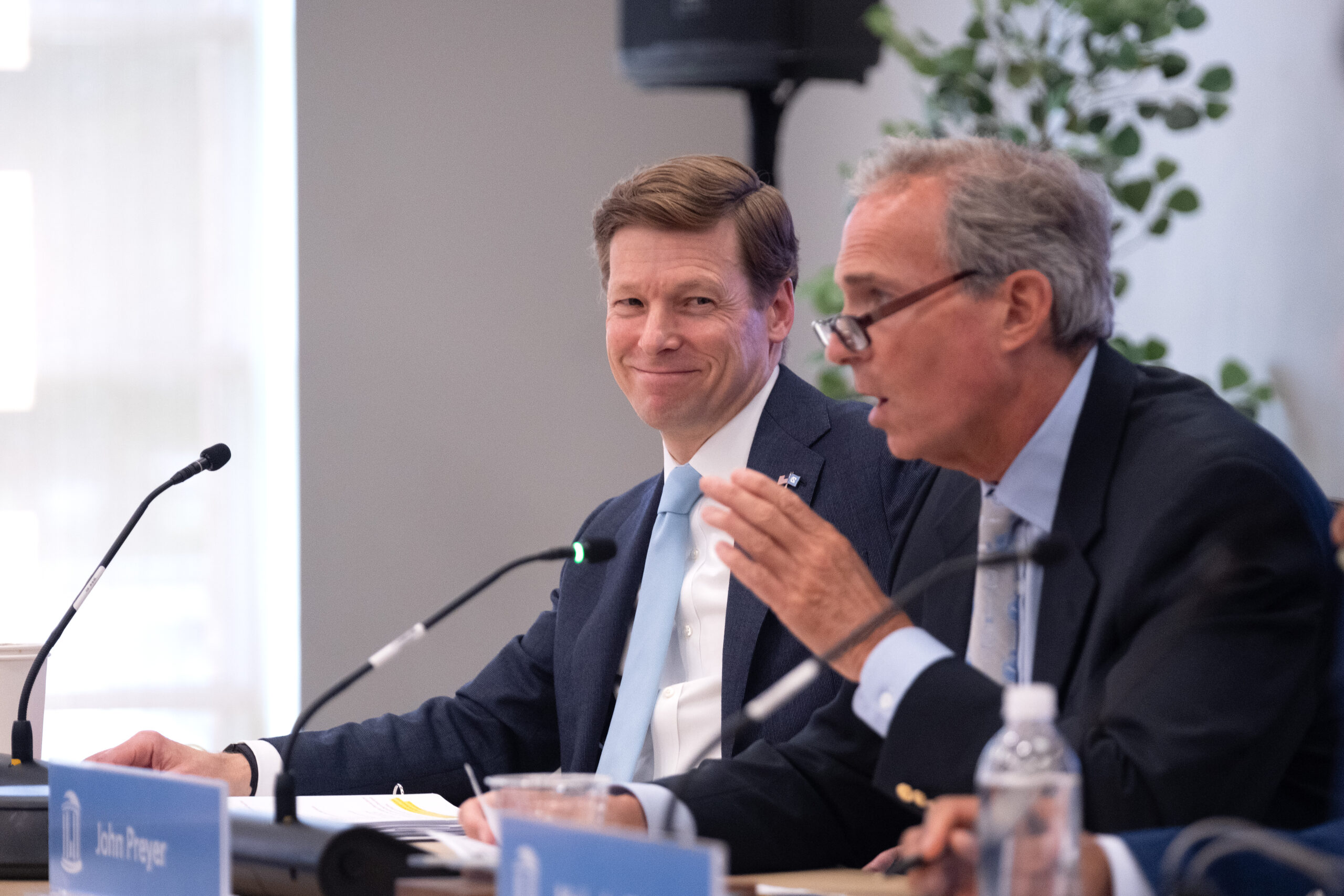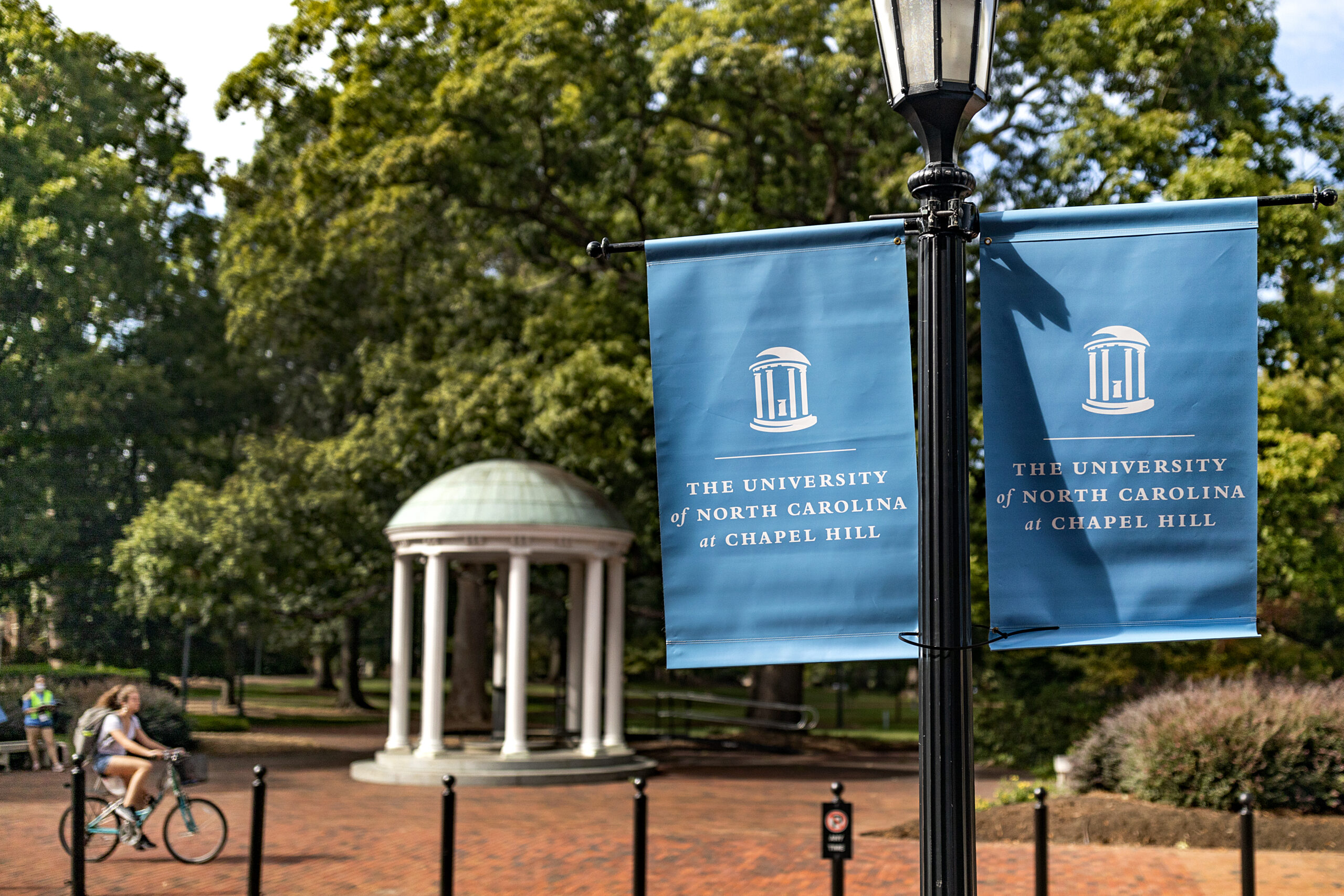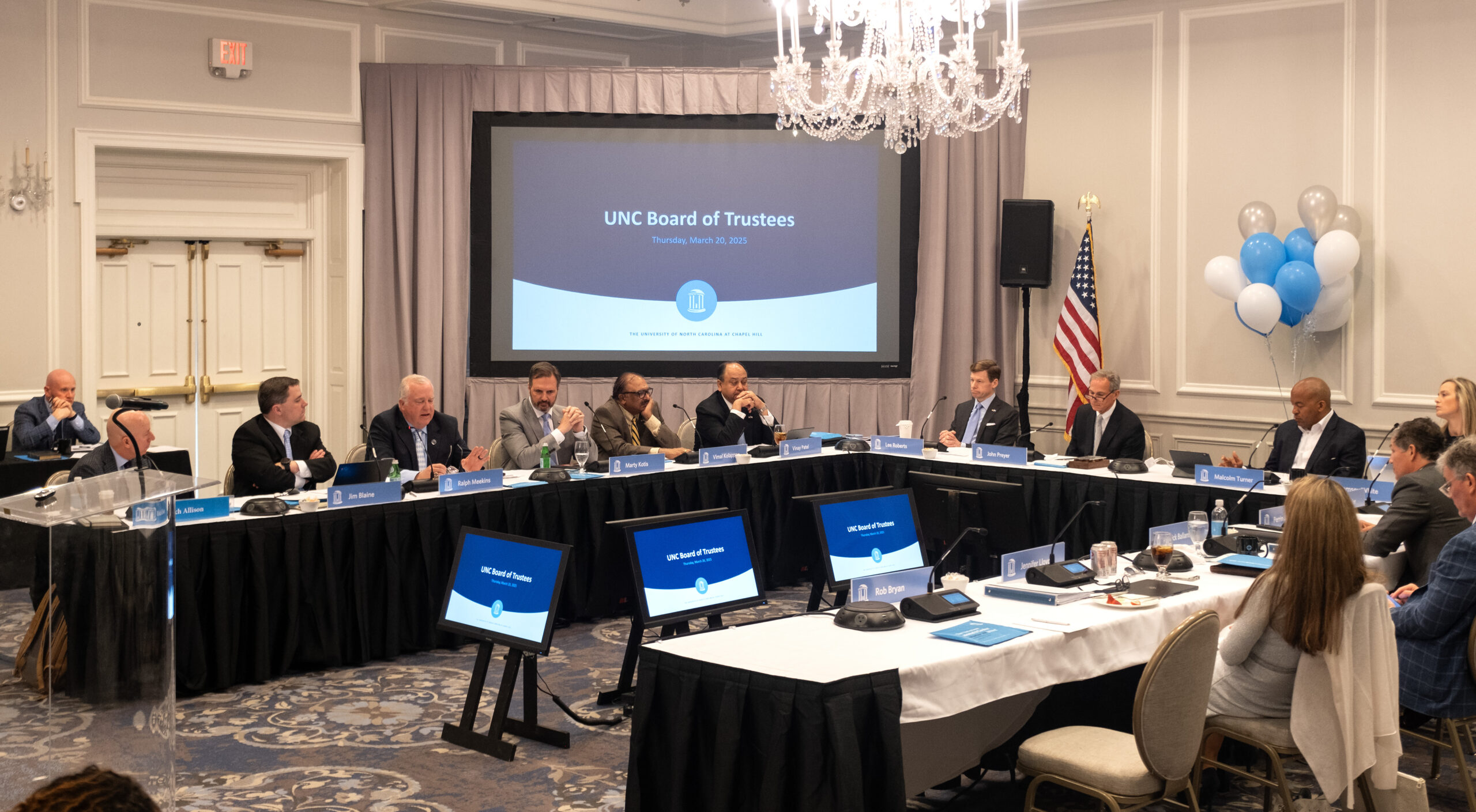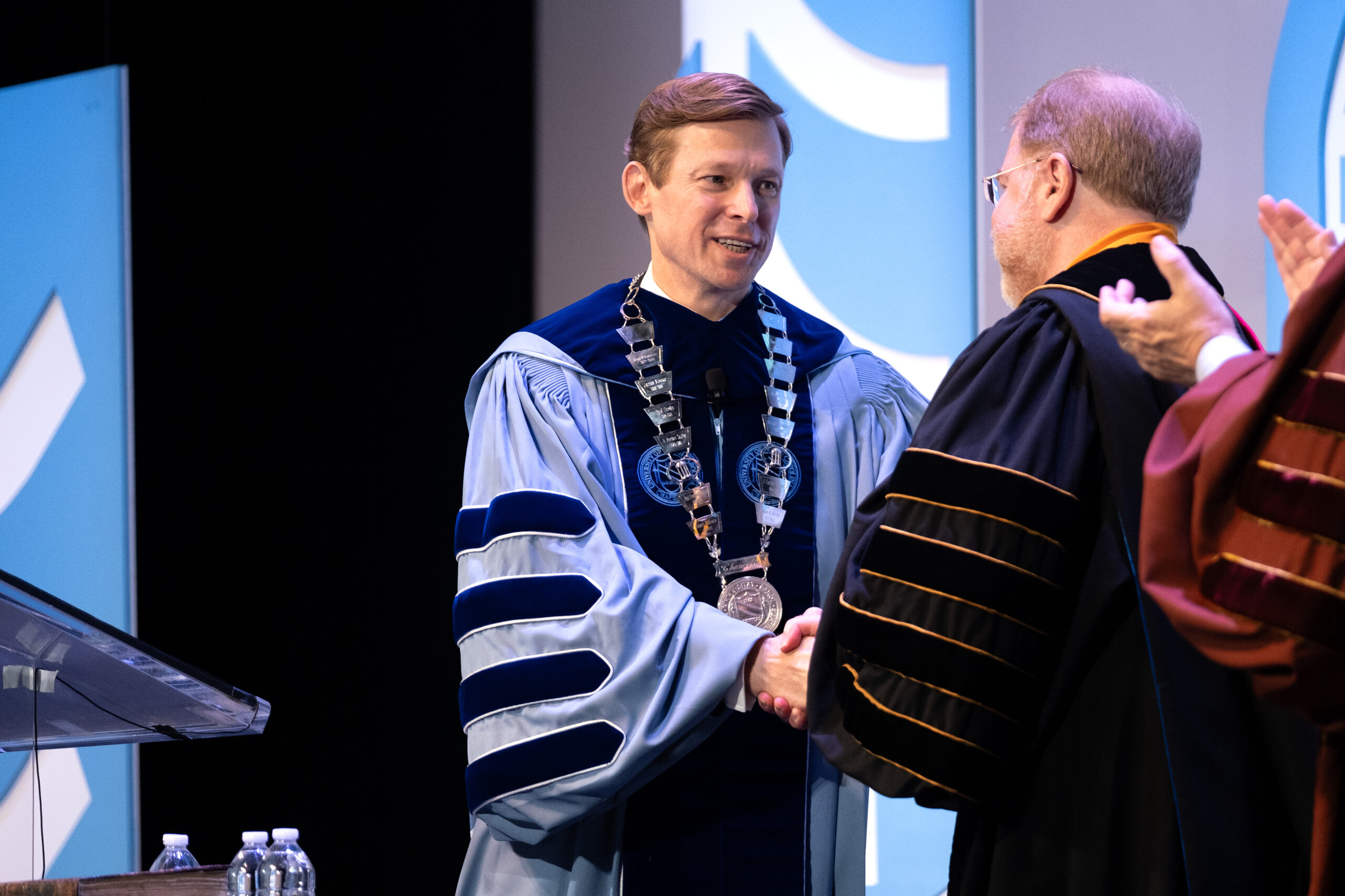The UNC Board of Trustees met Wednesday and Thursday in the Spangler Center in Chapel Hill for its regular bi-monthly meeting — the first of which since Lee Roberts was formally selected as Carolina’s permanent chancellor.
Though he took over as interim chancellor in January, Roberts still is going through some campus experiences and parts of the academic year for the first time.
“I’m a freshman too – and I’ve enjoyed campus traditions like convocation,” he joked toward the beginning of his remarks Thursday. “And I stood in line with our students at the Old Well for the first day of classes. You learn a lot about students’ hopes and anxieties standing in that line.”
Roberts’ presence at UNC Board of Trustees meetings is nothing new, though, as once again updated the board on several recent achievements and announcements. At the end, Roberts thanked the board again for their work together already and those who have sent him congratulations since the formal selection on August 9.
“I want to reiterate my gratitude for my opportunity to serve this remarkable state and this incomparable school,” said the chancellor.
Chair of the Board of Trustees John Preyer, as well as some of his peers, were on the search committee tasked with interviewing candidates who applied to be UNC’s 13th permanent chancellor. He said he believes Roberts is the right leader for where the university is right now – with several converging issues facing the institution.
“Carolina is a $4.5 billion enterprise, and we now have a successful private sector executive with public policy experience leading the university,” said Preyer. “What we need more of here, and what Lee Roberts can do so well, is operational efficiency and getting us excellence across the board.
“I’m glad Carolina picked a business man,” he added, “one with teaching experience, to run our university. I think it is a new model for all universities to replicate, and I am proud that Carolina is once again leading.”
Diversity, Equity and Inclusion Changes
Thursday’s meeting was also the first full board meeting after several position cuts and staff reassignments so the university could comply with the UNC System’s new policy regarding equality and “institutional neutrality.” Though discussion of the changes were not on the board’s agenda, the topic was referenced by some participants considering the system Board of Governors’ accepted the schools’ reports of policy compliance last week. Carolina led the 17 public schools in terms of employee upheaval, with 20 roles eliminated and 27 jobs reassigned.
Chair of the UNC Faculty Beth Morocco spoke to the trustees during committee meetings Wednesday and described the changes as seemingly “substantial,” but staff are waiting to going through the experience of the academic year to see what’s changed. She reminded the trustees, though, there is concern the changes could have detrimental effects on all campus stakeholders and the changes were not warranted.
“Although some of the faculty and many of you supported these changes, there was also eloquent [and] voluminous opposition by the majority of faculty,” said Morocco. “We did survey the faculty to give feedback to [UNC System] President Peter Hans and the system — and that was not just from our campus, but campuses across the system.
“But the policy did change,” the faculty chair concluded, “and moving forward, we’re committed to not only following the policy, but also [we] commit to creating and sustaining a diverse, equitable and inclusive community for our students, faculty and staff.”
Student Body President Jeleah Taylor described her own experience and what she’s heard from peers as part of her own comments to the board Thursday morning. She said the DEI changes are an example of why student involvement and shared governance is important when it comes to policy goals.
“Many students on campus,” she said, “felt like they did not have sufficient input on [a] decision that directly impact their daily lives at Carolina and across North Carolina. This change has sparked discussion and reflection within our community about the values we hold dear and how we can ensure that every voice is heard and represented.”
Roberts’ administration has maintained they will comply with the new policy while striving to ensure every student at Carolina feels welcome on campus. The chancellor added how he has tried to be visible to staff as they go through these transitions – and pointed to how nearly every employee who saw their role eliminated was reassigned to something else at UNC.
“Obviously, [we are] trying to communicate as broadly as possible,” Roberts told gathered media. “[I] appeared in front of faculty council on Friday to answer all questions that they had – as I do regularly, but there were quite a few questions about DEI during that discussion. I also appeared in front of the employee forum that same day, also to answer questions. We had a meeting with the Alumni Committee on Racial and Ethnic Diversity to talk about these topics. So, we’re just trying to have as much dialogue as possible, make sure we’re answering questions, and telling them everything we can.”
University Investments
In addition to its funding through the state government and donations from supporters, UNC also uses a broad investment portfolio to give itself and system schools a “a predictable and stable stream of annual spending distributions” through the nonprofit UNC Management Company, Inc. (UNCMC)
Jonathon King, the CEO of the fund, shared an annual presentation with the Board of Trustees during Wednesday’s budget, finance and infrastructure committee to report yearly growth of the fund, which invests and manages the long-term assets of UNC-Chapel Hill and some of its peers in the UNC System. Describing it as unlike a “monolithic bank account” or reserve account to be widely spent, King said the Chapel Hill Investment Fund — or UNC-Chapel Hill’s endowment — comes from gifts and donations made to the university and then reinvested elsewhere to accrue more money. The Chapel Hill Investment Fund finished the 2023-24 fiscal year at $5.5 billion, King reported, with the fund finishing with an increase of $488.6 million in market value— which was after the endowment distributed $284.6 million to support different university programs and development. Overall, the entire UNC Investment Fund covering all schools saw a 12.6% increase during the fiscal year to reach $11.1 billion.
The investment element of university operations came under scrutiny this spring as student protesters and activists demonstrated against Israel’s military actions in Gaza. Some of the leaders called for UNC to divest from any companies or group with ties or public support of Israel’s actions. But, as King said on Wednesday when pressed by Trustee Marty Kotis, there is little way to effectively ban a specific stock or individual investment based on the model UNC Management Company uses for the endowment money.
“The vast, vast bulk of our funds are in what’s called co-mingled vehicles — it’s like a mutual fund or ETF, but they’re in all the asset classes,” said King. “And we don’t own direct ownership in stocks or securities, we own ownership in the vehicle. It may seem like a minor point, but it’s more than that: we don’t own the underlying stocks, we’re not beneficial owners of the stocks.”
As a result of the student calls for transparency regarding the investments, Taylor said she is putting together the Investment Advisory Committee through the student government. Described as a combination of administrators, undergraduate and graduate students, faculty and employees, the student body president said the initiative will try to empower her peers through knowledge.
“Our primary objective is to discuss and learn about the intricate processes behind the university’s investment decisions,” Taylor said. “Our hope is to continue to expose students to processes that are not always easy to understand, and ensure that every student is getting the correct and clear information.”
Taylor also thanked King, Roberts, Vice Chancellor for Finance and Operations Nate Knuffman and Chief of Staff to the Chancellor Christi Hurt for providing “valuable” advice and direction on how to get the committee started.
Infrastructure and Development
A handful of development projects for the university were passed as part of the board’s consent agenda on Thursday, but trustees received more details about the efforts on Wednesday during the budget, finance, and infrastructure committee.
Two significant development projects are requiring UNC to take out debt to pay for them: a Translational Research Building on campus near Mason Farm Road and a new chilled water plant along Bernard Street along with improvements to the current chiller plants. The project funding numbers for both projects are significant, with the research building being an estimated $228,000,000 and the chiller plant updates being more than $155,000,000.
Knuffman described UNC’s plan as utilizing “self-liquidating debt,” which will use income generated by the projects once finished to pay off the debt accrued. UNC has the benefit, he said, of being one of just eight universities with a AAA bond rating. Both projects had already been approved by the UNC System Board of Governors and General Assembly — and with the approval on Thursday, the Translational Research Building is set to have a groundbreaking ceremony in October.
The new facility is projected to be built where two maintenance buildings currently stand in the bend of Daniels Road. The projected seven-floor research building will primarily help UNC expand its imaging and virology research, which includes vaccine development programs, pre-clinical drug development, and “high containment” research areas to study emerging diseases.
“It’s crucial to us to fulfill our research objectives,” Roberts said of the project. “The Translational Research Building will enable us to continue moving forward and growing our research footprint across a very broad front.”
Similarly, the additional chiller plant and upgrades will help the university as it enters a “growth mode.” Chiller plants help provide air conditioning to large facilities — and will help relieve the burden of UNC’s other existing plants as new buildings and expansions come online.
Chair of the committee Trustee David Boliek described the Translational Research Building as part of the university’s “economic engine.”
“[It will show] what we can do not only for the greater community we live in here the Research Triangle Park but the state of North Carolina and to the global community,” said Boliek, “in the sense of recruiting top researchers who will come here, do really good work, and have our students involved in a day-to-day basis to make the world a better place. As part of that, it creates economic development and resources that are spent and used here in our community.”
The Board of Trustees also approved an elevator design for Caldwell Hall, which is one of two academic buildings on campus with no ADA compliant entrances or exits. The century-old building will see an elevator and short bridge constructed on the west end near the Caldwell parking lot, with the addition pulled out from the building to maintain its original structure.
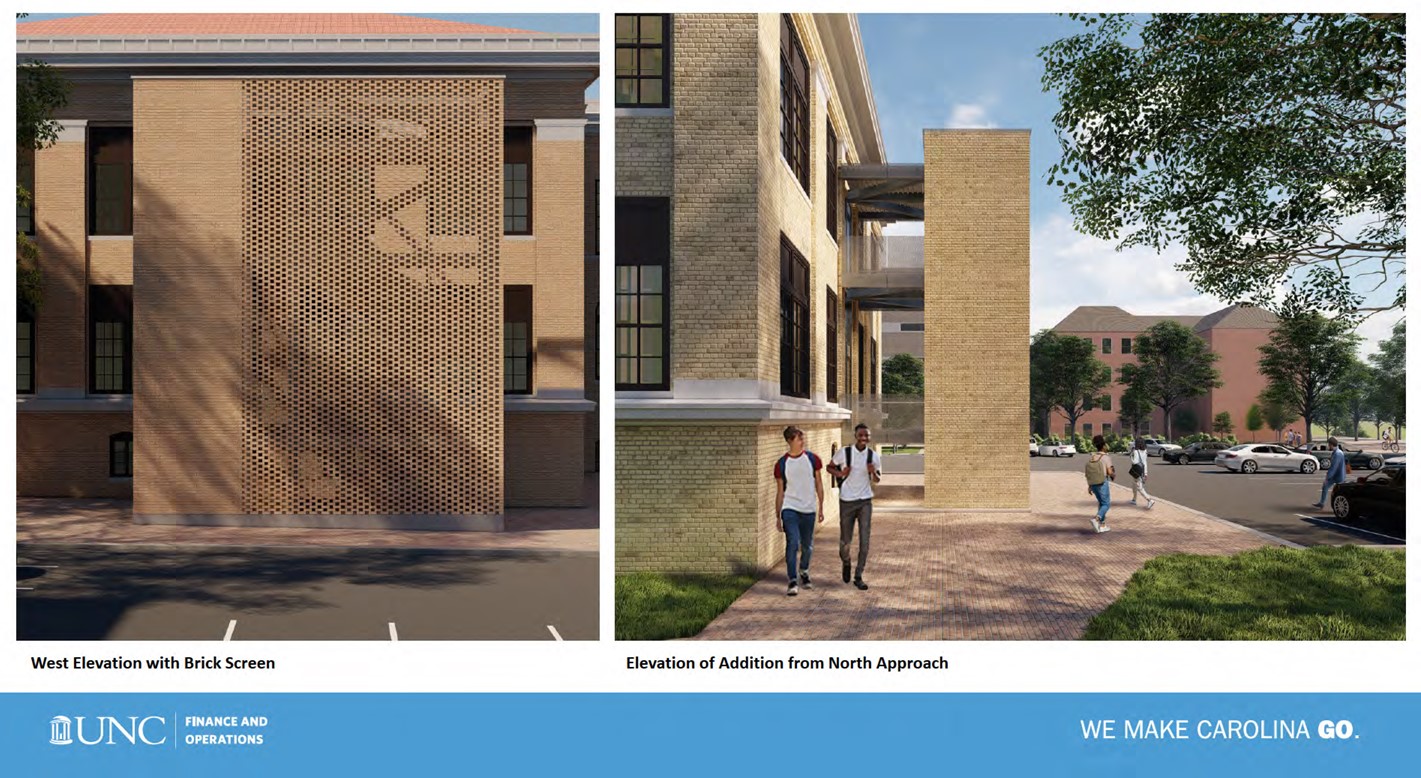
A design rendering for the accessibility elevator structure planned for Caldwell Hall on UNC campus. (Photo via UNC Finance and Operations.)
Featured photo via Jon Gardiner/UNC-Chapel Hill.
Chapelboro.com does not charge subscription fees, and you can directly support our efforts in local journalism here. Want more of what you see on Chapelboro? Let us bring free local news and community information to you by signing up for our newsletter.

